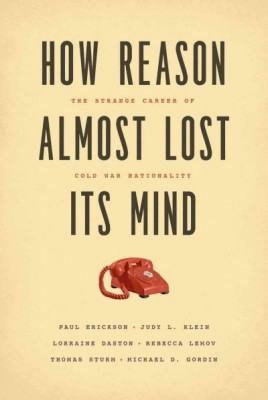| How Reason Almost Lost Its Mind: The Strange Career of Cold War Rationality Contributor(s): Erickson, Paul (Author), Klein, Judy L. (Author), Daston, Lorraine (Author) |
|
 |
ISBN: 022632415X ISBN-13: 9780226324159 Publisher: University of Chicago Press OUR PRICE: $23.76 Product Type: Paperback - Other Formats Published: November 2015 |
| Additional Information |
| BISAC Categories: - History | United States - 20th Century - Business & Economics | Economic History - Science | History |
| Dewey: 909.825 |
| Physical Information: 0.61" H x 6" W x 9" (0.87 lbs) 272 pages |
| Themes: - Chronological Period - 20th Century |
| Descriptions, Reviews, Etc. |
| Publisher Description: In the United States at the height of the Cold War, roughly between the end of World War II and the early 1980s, a new project of redefining rationality commanded the attention of sharp minds, powerful politicians, wealthy foundations, and top military brass. Its home was the human sciences--psychology, sociology, political science, and economics, among others--and its participants enlisted in an intellectual campaign to figure out what rationality should mean and how it could be deployed. How Reason Almost Lost Its Mind brings to life the people--Herbert Simon, Oskar Morgenstern, Herman Kahn, Anatol Rapoport, Thomas Schelling, and many others--and places, including the RAND Corporation, the Center for Advanced Study in the Behavioral Sciences, the Cowles Commission for Research and Economics, and the Council on Foreign Relations, that played a key role in putting forth a "Cold War rationality." Decision makers harnessed this picture of rationality--optimizing, formal, algorithmic, and mechanical--in their quest to understand phenomena as diverse as economic transactions, biological evolution, political elections, international relations, and military strategy. The authors chronicle and illuminate what it meant to be rational in the age of nuclear brinkmanship. |
Contributor Bio(s): Lemov, Rebecca: - Rebecca Lemov is associate professor of the history of science at Harvard University. Sturm, Thomas: - Thomas Sturm is a Ramón y Cajal Research Professor in the Department of Philosophy at the Autonomous University of Barcelona. Gordin, Michael D.: - Michael D. Gordin is professor of the history of science at Princeton University. Klein, Judy L.: - Judy L. Klein is professor of economics at Mary Baldwin College. Daston, Lorraine: - Lorraine Daston is director of the Max Planck Institute for the History of Science in Berlin and is visiting professor in the Committee on Social Thought at the University of Chicago. Erickson, Paul: - Paul Erickson is assistant professor of history and science in society at Wesleyan University. |